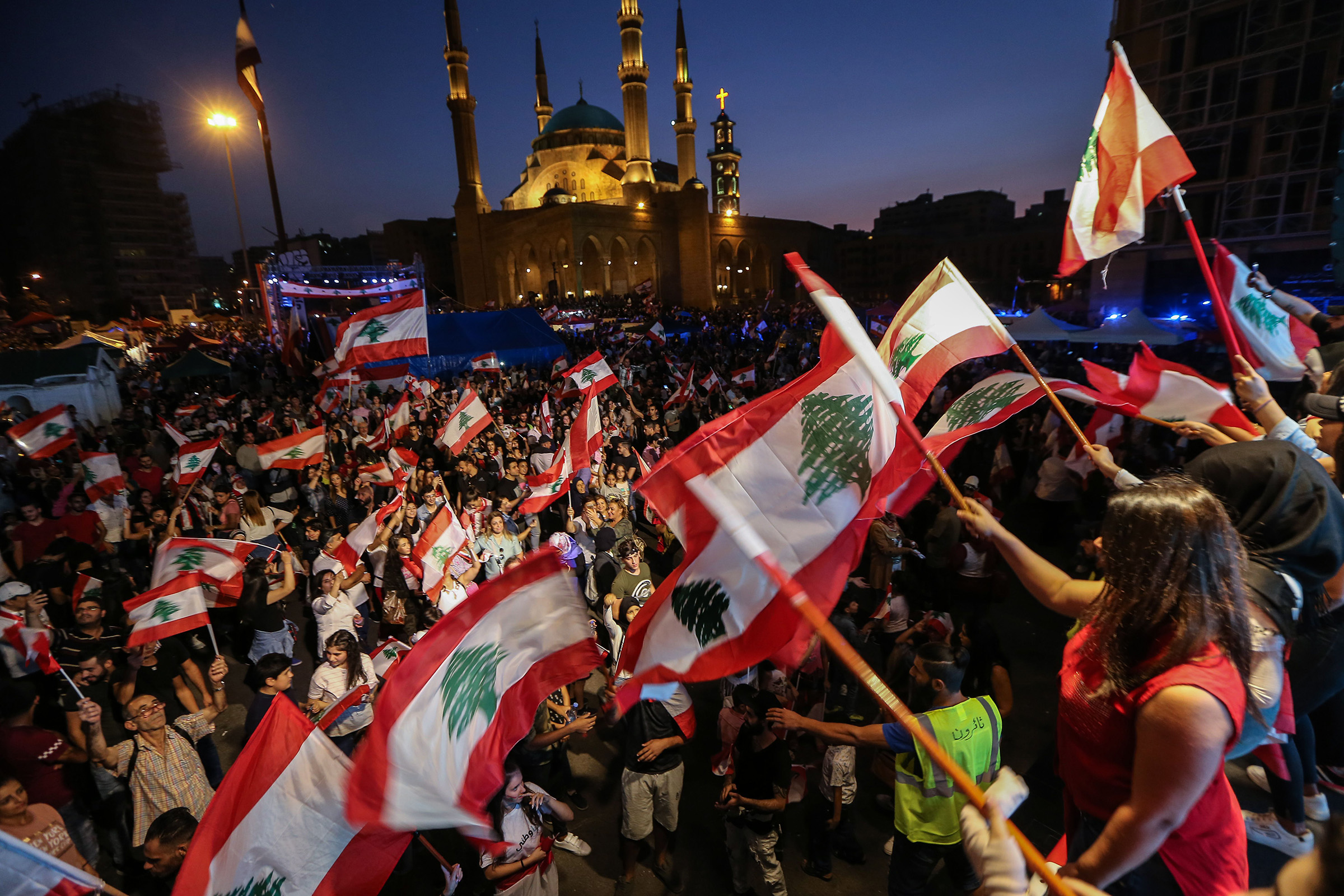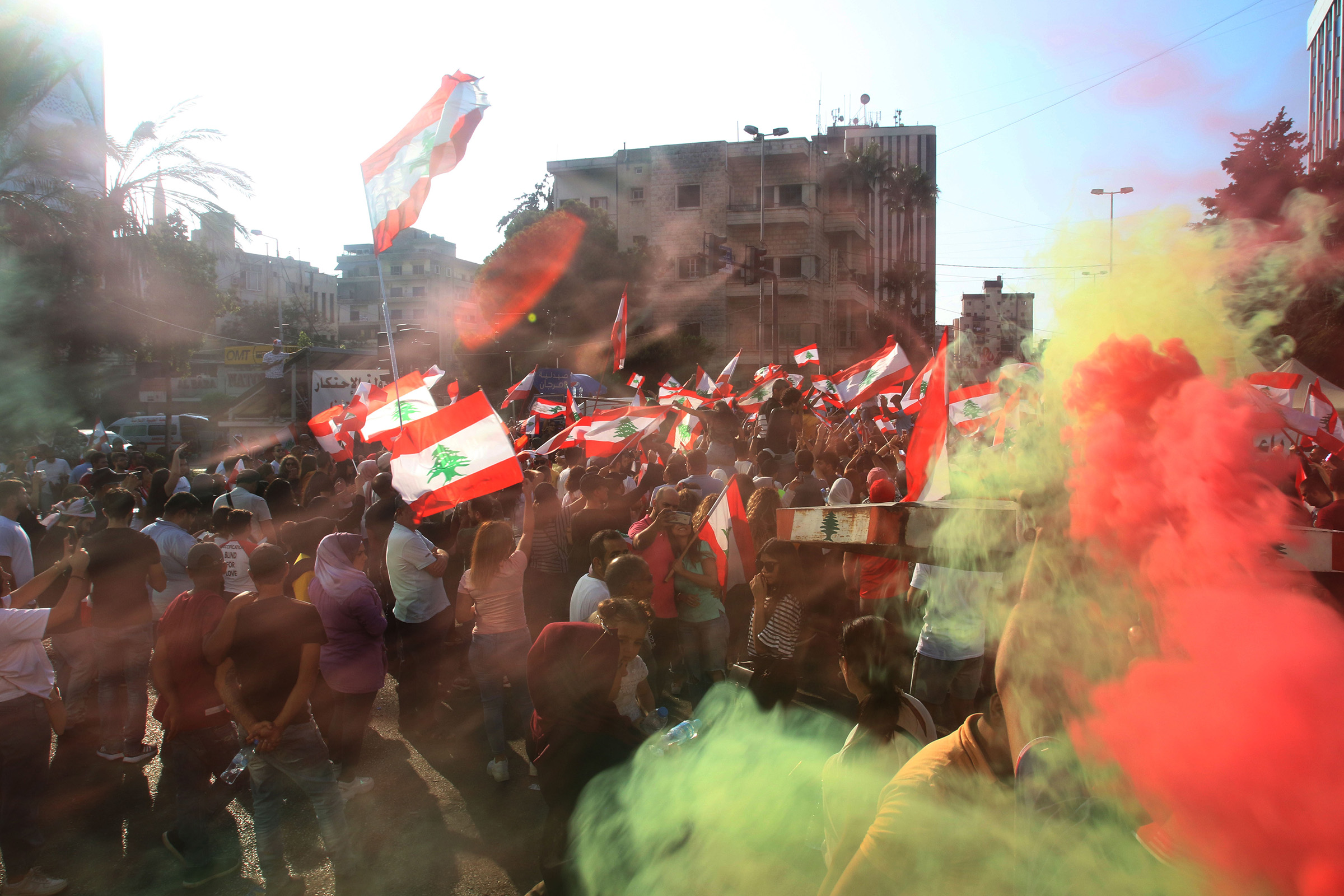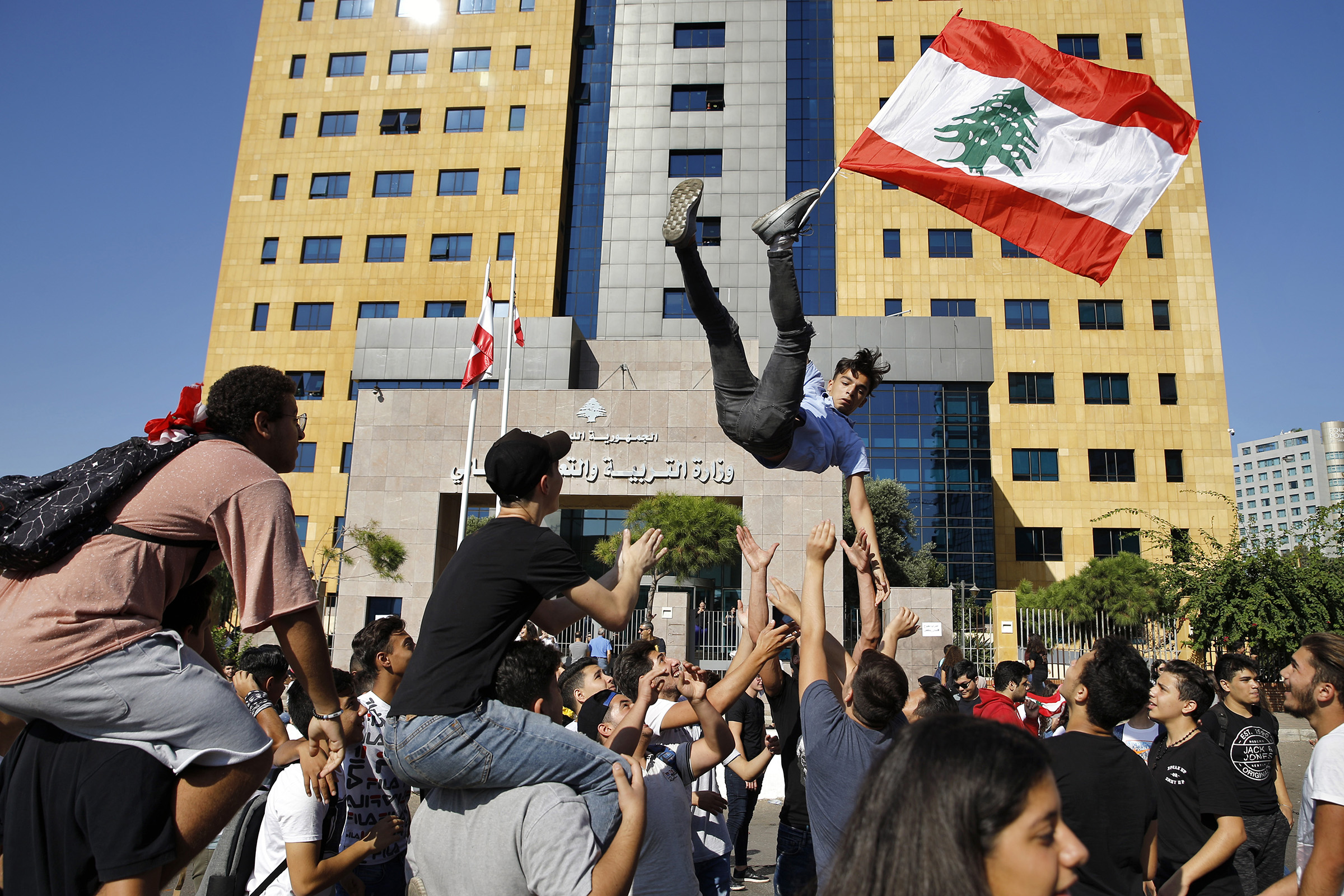
Through an expanse of red, white and green Lebanese flags in downtown Beirut on a Saturday night, a young woman’s voice emerges from a megaphone, leading chants against sectarianism and corruption in a spontaneous rally. Such protests have become the norm across Lebanon in recent weeks as people take to the streets to demand an end to corruption and an overhaul of the current political system.
In Beirut, the woman shouted slogans against the ruling class to the playful tune of “If you’re happy and you know it, clap your hands.” She then turned to social issues, denouncing sexism and the patriarchy before tackling a more controversial subject in Lebanon. “We want to topple homophobia; it must go,” she sang. The crowd echoed her enthusiastically.
In a country where homosexuality can be punished by up to a year in prison, and religious institutions that reject same-sex relations hold enormous power, the unconventional chant reflected the defiance of the uprising, and a surprising shift in attitudes toward LGBT rights.
“This revolution has raised the bar to the maximum,” said Hosam Hawwa, a 32-year-old demonstrator who had been leading chants at a different part of the protest. “There’s a newfound openness of thinking and we should push it to the end. All forms of exclusion aim to divide us, whether under the fraud of sectarianism or the fraud of homophobia.”
Previous surveys have shown that Lebanese society generally does not have favorable views of homosexuality, with a 2013 Pew Research poll saying 80% of the popultion reject it. But LGBT advocates are hoping the calls for political change and wave of anti-government protests are also an opportunity to re-examine the place of anti-gay sentiment in mainstream Lebanese society. While pro-government opponents of the protesters have latched onto this by hurling homophobic insults and raising concerns about the protesters’ diversity and openness, activists are turning the smears around. For them, combatting homophobia is part of a broader goal for a more inclusive, modern society free of sectarianism and bigotry.

Although it’s viewed as relatively socially liberal, Lebanon still criminalizes homosexuality in accordance with a law that dates back to the late days of the French Mandate, when France controlled the country from its modern founding in 1920 until 1943. While Lebanon’s penal code bans “all sexual relations contrary to the laws of nature” without mentioning homosexuality, it has been used to detain and prosecute gay men and trans women.
For decades, religious sect-based parties backed by regional and international powers have dominated Lebanese politics. But over the past few weeks, hundreds of thousands of people have blocked roads, organized sit-ins and gathered at rallies to reject that model and denounce all politicians, putting the spotlight on Lebanon’s dire economic situation, environmental issues, crumbling infrastructure and lack of adequate government services.
The protests have brought people of different sects and backgrounds together, creating a space for dialogue in the religiously segregated country. “There is a sudden sense of enlightenment,” says Fiona Abou Abdo, a psychomotor therapist who works with children on cognitive, behavioral and physical development. For instance, she says after attending an open discussion on economic issues at a sit-in near Martyrs Square in Beirut, people are getting rid of “bad habits,” including littering.
Combating anti-LGBT sentiment is not as easy, Abou Abdo adds, “because it’s not something executive”—a change in behavior that can be implemented quickly. But, she says, the protesters are showing respect to each other and displaying signs of open-mindedness toward everything.
Pro-LGBT rights graffiti tags are increasingly appearing next to anti-government slogans across the Lebanese capital. Hadi Damien, a prominent LGBT activist and founder of Beirut Pride, explains that, here, “gay rights” is an umbrella for several objectives. He tells TIME that local advocates are working on curtailing homophobia. “Nobody is calling for marriage equality or for the right to adoption. We are working on the decriminalization of consensual sex acts between adults in private, which doesn’t even mean legalizing homosexuality.”
Farah Chamas, a queer woman who works at a company that supports tech start-ups, says changes in attitudes towards destigmatizing sexuality started before the protests, but the uprising brought it to the surface. “People are standing together; they are feeling the same eruption of emotions,” Chamas, 28, tells TIME. “When it comes to social change and people’s perception of many issues—not only sexuality and the LGBT community— ’m very optimistic about it from what I’m seeing.”
Chamas says she does not identify as an LGBT activist, but she has seen many members of the community at the protests. “The community is at the core of the uprising. Our numbers are big at the protests, and we’re not standing in isolation. You see queer individuals sitting with people from completely different backgrounds and a lot of conversations are happening,” Chamas says.

Genwa Samhat, a Lebanese activist who previously served as the director of Lebanese LGBT advocacy group Helem, recalls a moment between protesters earlier this month. One group of demostrators started calling Foreign Minister Gebran Bassil, a frequent target of witty slogans, “louteh”—a deragotary word used to describe gay men. Others countered by chanting, “louteh is not an insult,” managing to put an end to the homophobic slurs. Derived from the name of the Biblical prophet Lot, the term “louteh” means sodomizer.
Lebanese media outlets largely refrain from using the term, but it has been employed by pro-government commentators to smear the protesters. “If the protests want to allow homosexuality… how can I accept it,” said Joseph Aboufadel, an outspoken pundit who supports President Michel Aoun in a recent TV appearance. And Charbel Khalil, a TV producer who is also an avid backer of the president, has accused artists and journalists of joining the protests to pass laws “relating to their homosexuality.” “Your homosexuality… your devils will not pass. You are dragging the country to destruction,” he said at a rally late in October.
When public figures use homophobic slurs to scare people and to create panic, Damien says, they highlight both their misunderstanding and disconnection of people’s realities. “It speaks volumes about misinformation, which pushes advocates to open channels of communication with them, and to create visibility that deconstructs these myths and prejudice.”
Samhat tells TIME such remarks aim to tarnish the uprising while stoking hatred against gay people. She adds that homophobia will not disappear from society if the ruling class falls, but a secular state would be a start for a long-term process to promote acceptance and equal protection under the law.
While recent rulings have interpreted Lebanon’s ban on “all sexual relations contrary to the laws of nature” as not applying to homosexuality, the Lebanese legal system does not always apply precedents. That means LGBT individuals remain possible victims of arrests and intimidation by the security forces. Samhat says the criminalization also makes LGBT individuals vulnerable to violence and blackmail as they cannot turn to the state for protection.
As the country faces an economic meltdown after years of dysfunctional governance, solidarity is on the rise. “People have come together in their misery,” Samhat says.
At the protests, LGBT activists are not explicitly demanding the decriminalization of homosexuality, but such aims are a part of the broader hopes of the uprising—to build a better country, Samhat says. And for advocates, this dream of a better country is one where the queer community will be able to openly call for reforms without fear of backlash or repression. “They are part of the overall crowd,” she says. “The only difference is that they are claiming their visibility because they have always been there.”
More Must-Reads from TIME
- Cybersecurity Experts Are Sounding the Alarm on DOGE
- Meet the 2025 Women of the Year
- The Harsh Truth About Disability Inclusion
- Why Do More Young Adults Have Cancer?
- Colman Domingo Leads With Radical Love
- How to Get Better at Doing Things Alone
- Michelle Zauner Stares Down the Darkness
Contact us at letters@time.com